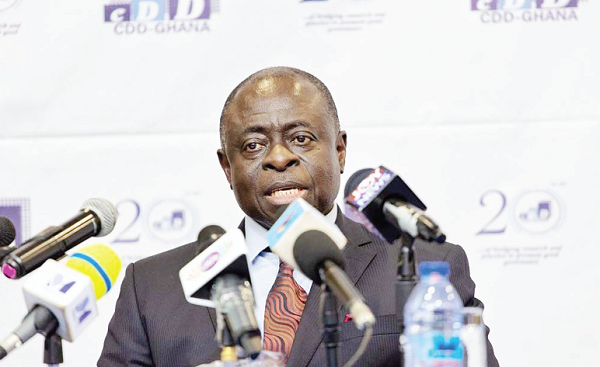
Separate party from govt — Gyimah-Boadi
The Executive Director of the Afrobarometer, Professor Emmanuel Gyimah-Boadi, has bemoaned governance practices in the Fourth Republic where government business has become virtually inseparable from party political business.
He has also expressed strong disapproval over the practice of government and party functionaries doubling as board chairpersons and chief executive officers of public institutions.
Advertisement
Speaking at the Kronti Ne Akwamu anniversary lecture organised by the Ghana Centre for Democratic Development (CDD-Ghana) in Accra last Thursday, Prof. Gyimah-Boadi said he also found it very worrying the persistent tendency of over-privileged ruling party officials and foot soldiers meddling in the nation’s governance and public affairs.
He also underscored the need for reforms to curb the discretionary powers of the President and urged him to go beyond the minimum requirement of consulting the Council of State in appointing public officials.
The Afrobarometer is a pan-African tool for surveying national public attitudes on issues of governance and democracy.
The lecture was on the theme: “Making democracy work for the people: Reflections on Ghana’s 25-year journey towards democratic development”.
It marked the 20th anniversary of CDD-Ghana and was the 14th in the series of lectures on democratic development which have had the likes of the Managing Editor of the Crusading Guide, Mr Malik Kweku Baako, and Professor Kwame Karikari, the current Chairman of the Board of Directors of the Graphic Communications Group Limited (GCGL), making presentations on various aspects of the country’s democratic governance.
Prof. Gyimah-Boadi was of the view that the wilful failure to separate government business from party political business in the country’s hyper partisan political party environment was the bane of accountable, responsive and inclusive governance in the Fourth Republic.
“I wish to note with complete disapproval, Madam Chair, the practice that has emerged in the Fourth Republic of effectively fusing the state with the ruling party. This practice, which all our parties are guilty of, removes the lines that should separate the state from the government and co-mingles government business with governing party business. The result is something of a party in government or call it party in government syndrome,” he said.
Lincolnian test
Submitting Ghana’s governance to the democratic test laid down by a former US President, Abraham Lincoln, that is, ‘government of the people, by the people and for the people’, Prof Gyimah-Boadi found some practices in the country’s efforts at democratising disturbing.
“It is particularly disturbing to learn that ruling party chairs participate in Cabinet meetings in both the National Democratic Congress (NDC) and the New Patriotic Party (NPP) administrations,” he stated.
He said although the practice was common in communist political systems, it was certainly an abnormality in democratic systems.
He said ruling party big wigs, spiritual advisors, security heads, traditional rulers, kitchen cabinet, unelected officials, external donors and unelected officials did not have a place in exercising undue influence in the country’s governance.
Manifesto policies
Prof. Gyimah-Boadi also urged Ghanaians to examine the practice of winning political parties taking public policies from their party manifestos and programmes.
“For example, taking free senior high school (SHS) or three-year SHS or one-time National Health Insurance premium straight to implementation by Executive fiat, without passing it through the legislation or subsidiary legislation process; something that could have allowed for broader and diverse civil society engagement and consultation and even parliamentary input.
“So are we now moving towards the winner knows all? As if the winner-takes-all politics wasn’t bad enough,” he stated.
He also expressed strong disapproval over the practice of government and party functionaries doubling as board chairpersons and chief executive officers of public institutions.
“The quality of the supervision of important state institutions would largely improve if leaders were appointed based on their competencies rather than their connections to the ruling party or personal links to the President,” he stated.
Participation
The Executive Director of the Afrobarometer said the participation of vulnerable groups such as women, people with disabilities, the poor and rural dwellers in politics and decision making was also a problem that needed to be addressed.
That was so because of the continued under representation of women in politics, with women making up only 37 members out of the 275-member Parliament and just 33 of the 254 municipal, metropolitan and district chief executives (MMDCEs) in the country, he said.
On whether Ghanaians were enjoying inclusive governance, Prof. Gyimah-Boadi was of the view that some strides had been made.
Such achievements, he said, included situations where Presidents of the country, since former President John Agyekum Kufuor, submitted themselves to Ghanaians occasionally to explain their policies and account for their actions.
That, he maintained, ensured greater accountability and responsiveness on the part of Presidents.
Prof. Gyimah-Boadi pointed to the opening of the University of Ghana Medical Centre at Legon and the government’s decision to take a second look at its proposal to review the Ameri agreement as examples of citizen action in changing policy in the Fourth Republic.
He expressed joy at the fact that governments in the Fourth Republic had endeavoured to continue projects and programmes started by predecessor governments.
Proposal
On the need for reforms to curb the discretionary powers of the President, he said: “Significant gaps remain in the progress made in democratic governance because of the nature of our Constitution and the manner of the country’s politics.”



